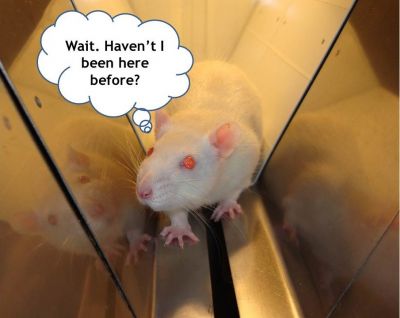Memory consolidation and neural systems
In addition to our studies on drug-seeking behavior, we are also investigating the neural systems underlying the consolidation of different kinds of learning. It is well known that, following a learning event, memories are not instantly laid down but rather involve a consolidation period. Moreover, the amygdala, specifically the basolateral amygdala, modulates the consolidation of many different kinds of memories. Emotional arousal activates the amygdala, which then mediates the effects of emotional arousal on the consolidation processes occurring throughout the rest of the brain. We also know that distinct regions of the brain are involved in different kinds of memories or specific attributes of those memories. Yet, the way in which memory consolidation organizes these separate processes remains unclear. Thus, while the amygdala appears to play a more "general" role in memory consolidation, other regions of the brain play far more specific roles.

Therefore, to address these issues, we combine a variety of systems-level approaches with different learning and memory tasks in order to assess the roles of specific connections between brain regions such as the basolateral amygdala and other forebrain regions in the consolidation of distinct types or aspects of memories. We use a number of learning and memory procedures to investigate this, including contextual fear conditioning, Barnes mazes with both spatial and cued-response learning procedures, and inhibitory avoidance.
Frequently, we manipulate the activity of pathways from structures such as the basolateral amygdala immediately after each kind of training and, thereby, influence the retention for this training. In addition, we can examine how such stimulation and inhibition alters the expression of plasticity-associated proteins in downstream brain regions and activity in other regions during the consolidation period.
These experiments provide a novel method for interrogating those systems controlling memory processes and we hope to use them to come to a significantly deeper understanding for one of the most fundamental functions of the brain and of who we are: Memory.